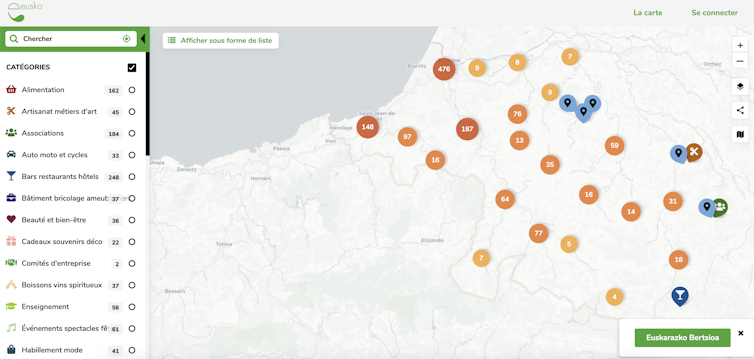As the currency war rages between the dollar, the euro and even the yuan, the issue of local currencies is back in the spotlight. Complementary local currencies, or convertible local currencies, are monetary systems set up at the local level to boost the local economy. Exchangeable at parity with the euro (1 eusko = 1 euro), but usable only within a limited network of participants – retailers, associations, institutions – they aim to redirect consumption towards short supply chains.
While their dynamics have largely fuelled theoretical thinking, complementary local currencies have been the subject of much less empirical analysis in terms of their concrete impact. They nonetheless remain a significant phenomenon within social innovation initiatives. More than 4,500 experiences of this type have been documented in the literature over the past thirty years.
In France, the Eusko, launched in 2013 in the Basque Country, is often cited as a model. With more than 5,400 users, 4.4 million euskos in circulation and a transaction volume of 6.5 million euskos in 2024, it is the leading local currency in Europe. But can the use of these currencies have an effect on individual behaviour? Our study conducted in Bayonne shows that the use of the Eusko not only promotes short supply chains, but also seems to make users more cooperative.
Lab-in-the-field
To explore this hypothesis, we designed a ‘lab-in-the-field’ experiment, i.e. a behavioural test inspired by classic experimental methods but carried out in a natural setting. In this case, the cafés and bookshops in Bayonne city centre.
We recruited over 300 volunteers to play a game known as the ‘ultimatum game’, a well-known experiment in behavioural economics. The principle is simple: one player, the “proposer”, proposes a division of a sum of money with another player, the ‘respondent’. The latter can accept or reject the offer. If the offer is rejected, neither player wins. In this version of the experiment, each participant makes their decision before knowing the other's decision. This method allows preferences to be assessed in isolation, as well as each player's thresholds of acceptability.
But this time, the novelty lay in the currency used to play: some participants played with euros, others with Euskos. We wanted to know whether the mere presence of this local currency, which embodies a collective commitment, could influence the players' choices.
Cooperation trigger
The results are striking. Regular users of Eusko are significantly less likely to reject offers when playing with the local currency than when playing with euros. In other words, when faced with an offer they consider imperfect, they are more likely to accept it when the interaction takes place in Eusko. This behaviour reflects a decrease in negative reciprocity, i.e. a lower tendency to “punish” a proposal perceived as “unfair”.
However, no such effect was observed among non-users of the Eusko, as the samples were randomised. We conclude that it is indeed regular use of local currency, and not any pre-existing individual differences, that triggers this cooperative reflex.
Shared values
Why would a simple currency have this power? Our study puts forward a theoretical interpretation: the Eusko activates collective intentions that are already present among its users. In other words, by handling the currency, participants reconnect with a latent commitment to local solidarity. The currency becomes a marker of shared values, both symbolic and moral, which influences how players interpret the situation.
This mechanism can be explained by the theory known as ‘goal-framing theory,’ according to which our behaviour is shaped by contextually activated goals. Three types of frames coexist: the hedonic frame, which seeks immediate pleasure/well-being; the gain frame, which seeks long-term material self-interest; and the normative frame, which adheres to collective rules and values.

Map of shops where you can pay for your purchases with the eusko. Euskal Moneta, Provided by the author
In this context, Eusko does not create new motivations. It seems to reactivate a pre-existing normative framework among regular users: a relationship with the community, solidarity and cooperation. By highlighting these objectives, the currency influences their behaviour in a less competitive, more conciliatory way.
Relocalising the economy
The change in currency in this experiment did not alter the behaviour of the ‘proposers’, who generally proposed a fair distribution. This was probably due to the public nature of the experiment and a social desirability bias. The effect observed only concerned the ‘respondents’, i.e. those who accepted or rejected an offer. The results confirm an intuition shared by many actors in the social and solidarity economy: alternative systems such as local currencies are not neutral.
Like other local currencies in France, the Eusko has often been defended for its ability to relocalise the economy and strengthen short supply chains. This study shows that it could also play a more subtle but equally important role: strengthening cooperation norms within a committed community. These results reignite the debate on the role of monetary tools in social transformation. They suggest a promising avenue for research: analysing not only the direct economic effects of these innovations, but also their ability to shape mental representations and collective behaviour.
While identity dynamics linked to the Basque context are sometimes cited to explain the success of Eusko, it seems to be driven more by a fertile socio-political context shaped by decades of territorial mobilisation and trust building.




